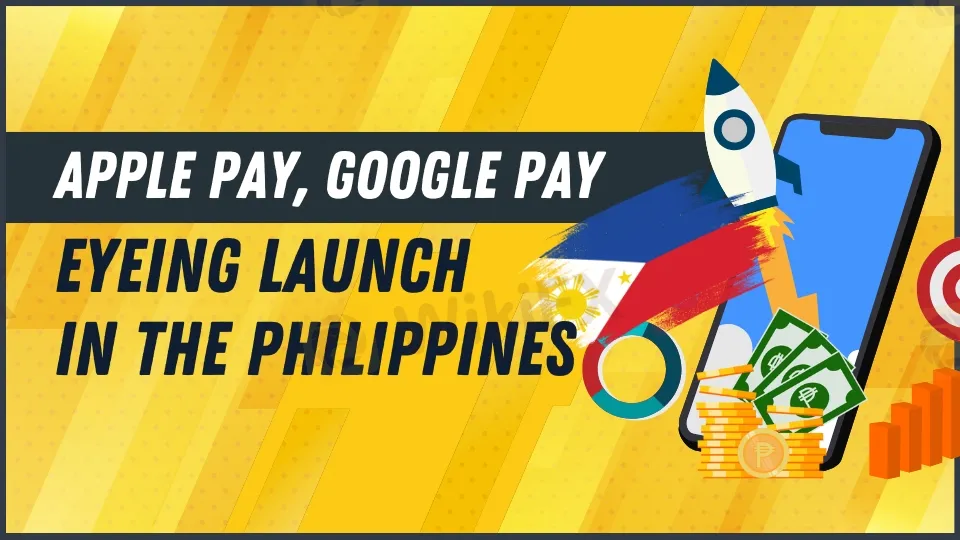简体中文
繁體中文
English
Pусский
日本語
ภาษาไทย
Tiếng Việt
Bahasa Indonesia
Español
हिन्दी
Filippiiniläinen
Français
Deutsch
Português
Türkçe
한국어
العربية
Apple Pay, Google Pay Eyeing Launch in the Philippines
Abstract:Apple Pay and Google Pay plan to enter the Philippine market. To do so, they must first register with the BSP as operators of payment systems.

Apple Pay and Google Pay are exploring the possibility of launching in the Philippines but must first secure registration with the Bangko Sentral ng Pilipinas (BSP) as operators of payment systems (OPS), according to a top official.
BSP Deputy Governor Mamerto Tangonan shared that meetings have been held between the central bank and representatives from both Apple Pay and Google Pay, which are still not available in the Philippines. “They‘re exploring, and we’ve had discussions about their activities. Its clear that when you touch the payment system, you are an operator of payment systems,” he explained in an interview with reporters.
As per the BSPs regulations, any entity providing clearing or settlement services in a payment system must register with the bank. This includes defining, controlling, or maintaining the operational framework for such systems. This requirement is outlined in the National Payments Systems Act (NPSA).

To date, Tangonan noted that Apple Pay and Google Pay have not yet filed applications for registration with the BSP. Once registered, the services can be made available to the public, but the process may take a month.
Both Apple Pay and Google Pay allow users to make financial transactions through near-field communication (NFC) devices, enabling payments via smartphones or smartwatches linked to debit or credit cards and e-money accounts.
Tangonan clarified, “We don‘t license them. We just require registration. Once they’re registered, they can provide the service.” However, he noted that it was unclear why the service providers had not yet filed their applications. “Maybe they are already in the process,” he speculated.
The BSP also reported that digital payments accounted for 52.8% of retail payment transactions in 2023, surpassing their 50% target under the Digital Payments Transformation Roadmap 2018-2023, up from 42.1% in 2022.
Final Thoughts
The entry of Apple Pay and Google Pay into the Philippine market will likely provide a significant boost to digital payment adoption in the country. However, their success depends on completing the necessary regulatory requirements with the BSP. The next few months could be pivotal in determining how soon Filipino consumers will gain access to these global payment giants.

Disclaimer:
The views in this article only represent the author's personal views, and do not constitute investment advice on this platform. This platform does not guarantee the accuracy, completeness and timeliness of the information in the article, and will not be liable for any loss caused by the use of or reliance on the information in the article.
Read more

RM5.9M Lost to "Davidson Kempner Capital Management" Facebook Scam
A private contractor in Malaysia faced a devastating loss of over RM5.9 million after falling victim to a fraudulent investment scheme promoted on Facebook. Tempted by the scheme’s impressive claims and credentials, the victim began investing in September 2024. The investment process required him to download an application called A-Trade, which was readily available on the Apple Store.

BI Apprehends Japanese Scam Leader in Manila
The Bureau of Immigration apprehended a Japanese scam leader in Manila for targeting elderly victims in Japan, with plans to investigate possible local operations.

DICT Pushes for Stronger Cyber Laws to Address Evolving Scams
The DICT is advocating for stronger cybercrime laws to tackle the growing and evolving threat of online scams in the Philippines.

Beware: Pig Butchering Scam Targeting Vulnerable Individuals
Beware of the rising 'investment scam' or 'pig butchering scam,' preying on students, homemakers, and job seekers, causing daily financial losses, warns Union Home Ministry.
WikiFX Broker
Latest News
SQUARED FINANCIAL: Your Friend or Foe?
Big News! UK 30-Year Bond Yields Soar to 25-Year High!
ACY Securities Integrates MetaTrader 5 to Enhnace Copy Trading Service
Soegee Futures Review: Should You Trust This Broker?
Malaysian Pilot Loses RM1.36 Million in UVKXE Investment App Scam
Indonesia officially joins the BRICS countries
Attention! Goldman Sachs Cuts Gold Target to $2910
Inflation Rebounds: ECB's Big Rate Cut Now Unlikely
Carney \considering\ entering race to replace Canada\s Trudeau
High-Potential Investments: Top 10 Stocks to Watch in 2025
Currency Calculator






